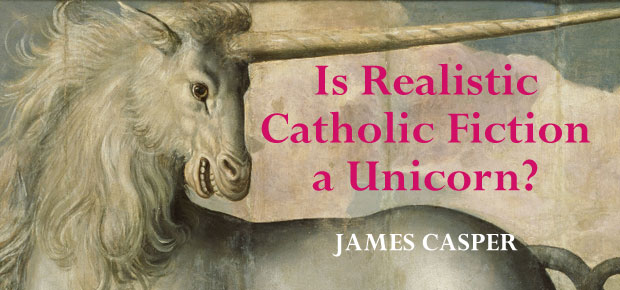
The accusation of blasphemy, at times directed at Christ, recorded in the Gospels, has long been directed at writers of Catholic fiction attempting to be realistic. Christ was a realist about his times and the world in which he mingled. He could also at times seem idealistic, e.g. in The Sermon on the Mount or in his belief that the apostles appointed to wait for him at Gethsemane would be watchful and not drift off to sleep. Inevitably though, he would return to his core realism as when he reminded Peter about his denial three times before the cock crowed.
There is a long literary tradition of something that could be described as Catholic fictional realism. Some notable examples can be found in the writings of Boccaccio, Chaucer, Dante Alighieri, Cervantes, and so on into modern times. Throughout this period, writers have taken enormous chances and borne accusations of blasphemy. J.R.R. Tolkien, a medievalist, would not hesitate to say that the anonymous monk, author of the great British epic Beowulf co-mingling core Christianity and Germanic religion, would have been one such, and could well have been punished by an abbot caught up in the culture wars of St. Augustine’s era.
James Joyce (The Dubliners), Graham Greene (The Power and the Glory), and Evelyn Waugh (Brideshead Revisited) attempted Christian realism as did painters of the Pre-Raphaelite era, all of them accused of blasphemy in not so many words. Let us not leave out Oscar Wilde (The Picture of Dorian Gray), apparently converted to Catholicism on his deathbed, a witty Irish realist. Today, specifically Catholic realism, more and more as elusive as a unicorn, seems to have left writers in the world of St. Peter’s denials, but unlike Peter, with nowhere else to go.
Was there laughter in the Garden of Eden? Did God and his creations not engage in a merry dance before the Serpent intervened? Has this jocund thread of creation died out somewhere in the lurid story of Cain and Abel? The Devil has always been serious. Are serious novelists exploring the Christian world with its doubting Thomases, its denying Peters, its treacherous Judases to be left with nowhere to go, dismissed as blasphemous when they become ironic, sardonic, and satirical? Are they to be called anti-Catholic when they attempt to find humor in sad situations? Should authors be condemned for what their characters think and do? Can authors, like Jesus, explore the limits of human behavior and at times be idealistic and even romantic before returning to the central core of Christian belief?
Must we abandon our craft to hamstrung writers and ham-fisted reviewers for no better reason than getting published?
Somewhere along the way, realism became connected to seriousness while at the same time, humor was banished. The writer could not be funny in religious matters without being seen as an enemy of the Faith. It goes without saying that certain elements are inviolable, the Eucharist for one. When anti-Catholics indulging in pig Latin describe the words of Consecration as hocus-pocus, they join forces with the jeering crowds of Palestine. We cannot joke about the Real Presence, but we must be free to regard and acknowledge as Christ did, that even people (Judas) receiving communion can be either saint or buffoon denying God in their footsteps returning to a pew.
The great enemies of the Faith are nonsense, equivocation, and diversion, all tools in Satan’s workshop (Marlow’s Dr. Faustus), but nowhere near the writer’s craft called Catholic realism.
Serious Catholic writers are well aware of boundaries that may not be crossed before descending into what is truly blasphemy. But as long as human beings remain human in ways that St. Peter was human, and the apostles at Gethsemane were flesh and blood; as long as people fail; as long as the ancient crowds of Palestine still mingle in streets where Christ might have walked; as long as a novelist may think—as I do—that Christ, on Sunday mornings may be found among the poor at your neighborhood Walmart; for that long, we have our work to do.






Lorenzo Gil Badiola
December 15, 2017 at 12:59 pm
The faults of this essay are many: the first of them being that no definition of Catholic realism is provided. Without a definition as to what Catholic realism is or the provision of a criterion to determine if a literary composition should be counted as a work of Catholic realism, this ambiguity could be used to exclude the fantastical and by fantastical I mean such genres as science fiction, fantasy, magical realism, etc. On the other hand, all the other faults can be classified as sins of omission. You forgot to mention Chesterton, Belloc, Benson, Kirk, Flannery O Connor, and Michael O’ Brian, a recent Catholic writer of Science fiction.
James Casper
December 15, 2017 at 6:38 pm
Thank you for your comment. As a fiction writer, I rely on readers to tell me what I said.